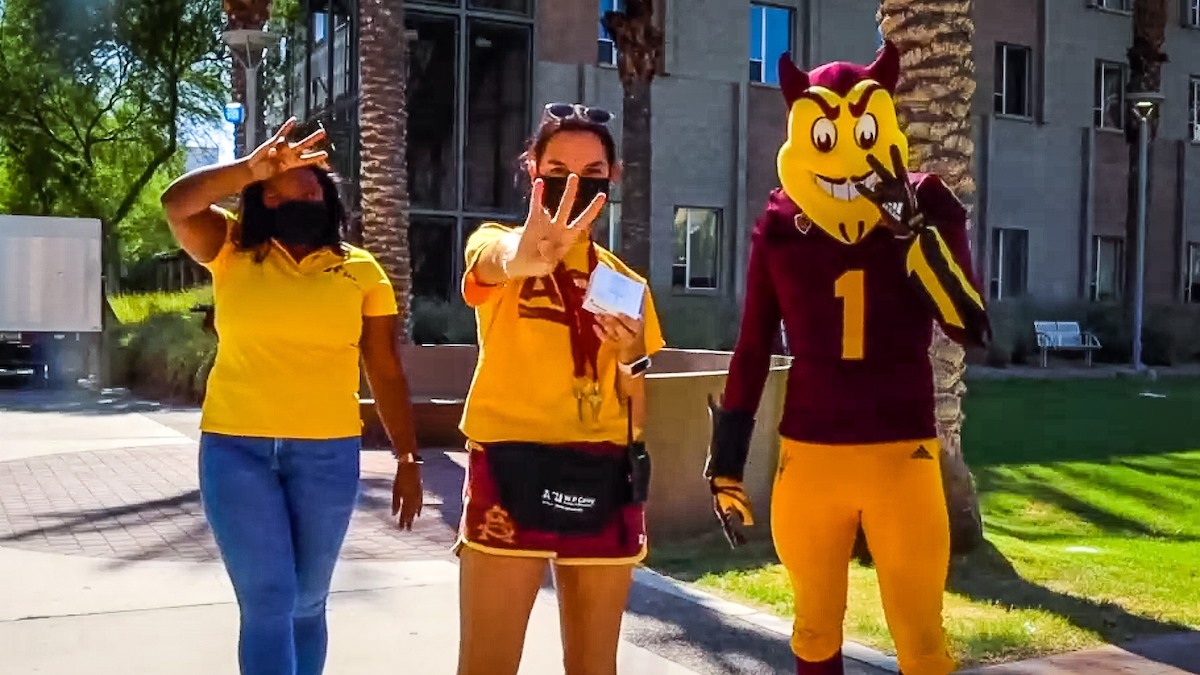For a second year in a row, Arizona State University has been ranked among the top 10 universities in the nation for first-year experiences, according to U.S. News & World Report. ASU ranked No. 9 in the nation in the 2-year-old category — outperforming Brown University, Princeton University and University of Texas at Austin.
No matter the population, universities and colleges are big places to first-year students, and ASU is no exception. First-year students have a lot to think about: what classes to take, where to live, how to make friends. And now, they face navigating the college experience during a pandemic.
ASU is constantly evolving its tools and resources to help first-year students feel welcomed and to make sure they are set up for success. It’s so important to the university’s goals that over the summer, ASU’s Educational Outreach and Student Services launched ASU Family Hub, expanding outreach and resources to parents and families looking to create personalized university experiences.
More U.S. News & World Report rankings: ASU ranked No. 1 in innovation for 6th year | Undergraduate business program rises in rankings | Senior capstones move up 9 spots
Below is a guide to the many resources ASU offers first-year students — some of which are available even before they enroll.
Getting started
The private social network is available through MyASU and allows newly admitted students to connect with their new classmates virtually, helping them find friends, look for roommates and ask questions. Devil2Devil is open to students attending in-person degree programs at the Downtown Phoenix, Lake Havasu City, Polytechnic, Tempe and West locations. The University Technology Office (UTO) launched the current platform for fall 2020 but plans to keep using the tool moving forward.
The student-led podcast, which launched in November 2017, offers incoming ASU students inside information about living on campus, financial aid and joining clubs plus tips from current Sun Devils.
ASU’s chatbot has been answering questions about the university for incoming students since 2018. Sunny has been so successful — reaching more than 36,000 students via text message — that ASU recently expanded the chatbot’s capabilities, offering help in Spanish to reach parents who may also want to go to college.
Sun Devils resources
ASU is now an Adobe Creative Campus, which means students get free (yes, free!) access to Adobe Creative Cloud. Through ASU’s Digital Backpack, students can also access Zoom, Slack, Dropbox and G Suite, which are tools widely used in tomorrow’s workforce.
ASU’s award-winning center helps students thrive inside and outside the classroom by offering a variety of peer coaching services. Because of the pandemic, the First-Year Success Center has been adding new support services, including texting. Coaches are available to answer general questions about college life, provide insider tips and advice on academics, scholarships and ways to get involved on campus. The center was recently touted in the 2021 Fiske Guide to Colleges as part of ASU’s effort to offer strong support services for new students.
Adulting is hard, so the saying goes — which is why ASU Adulting 101 is the ultimate resource for Sun Devils on navigating academics and college life in general. Adulting offers up thought-provoking advice that students may not learn in classes via Instagram and a newsletter and blogs in five specific categories: career, study, wellness, living and money. Adulting encourages students to ask for help if needed.
Community contributions
ASU’s Career and Professional Development Services has created an online hub that helps connect students with current career and internship opportunities. Students can ask career-focused questions (and can do so anonymously) and communicate with students and alumni who may be working in their field of interest. Handshake also hosts workshops and promotes virtual events like the campuswide Fall Career and Internship Expo, which will be held virtually Sept. 29 to Oct. 1.
The UTO-led initiative is made up of 3,000-plus ASU community members, including students, who are committed to shaping the future of learning in the digital age. The action-oriented group collaborates with learning-focused groups around the word. ShapingEDU hosted this year’s Learning(HU)Man — a weeklong series of events for students who want to shape the future of education.
Top photo courtesy ASU
More Sun Devil community

Tested tips for taking exams
With May quickly approaching, many students are starting to prep for their most important tests of the year — final exams.Toni Miceli, the inaugural director of the bar exam success program at…

School of Transborder Studies celebrates 15th anniversary
During the summer before his freshman year at Arizona State University, Salvador Macias participated in the AGUILA Youth Leadership Institute, a college access organization designed to help young…

Barrett program unlocks study abroad for first-year honors students
Twenty first-year students from Barrett, The Honors College at Arizona State University are spending their second semester studying abroad in Rome, Italy.Traveling in a tight-knit honors community…


